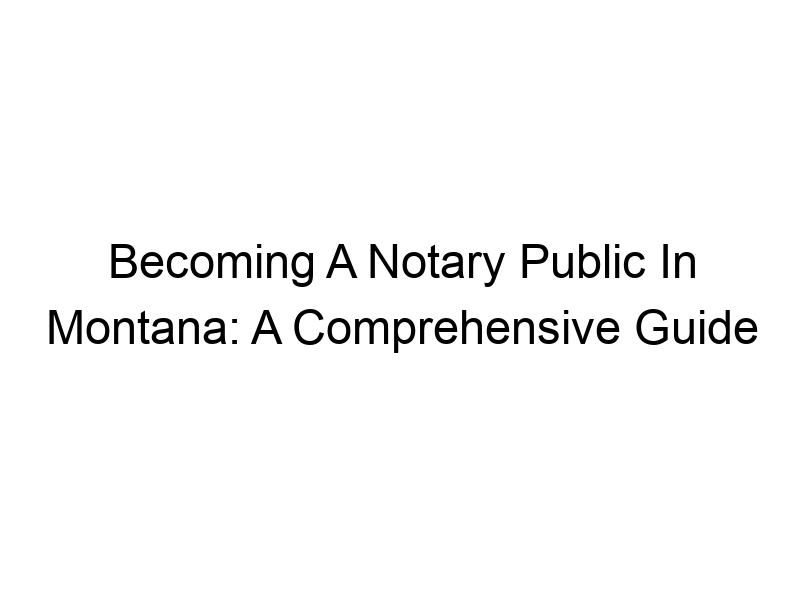Montana’s notary public system ensures the authenticity and validity of documents. This guide provides a complete overview of how to become a notary in Montana, covering the application process, requirements, responsibilities, and everything in between. You’ll learn about the necessary qualifications, the application process itself, the fees involved, and the ongoing responsibilities you’ll face as a commissioned notary. We’ll also dispel common myths and misconceptions. Let’s get started!
A notary public is a public official appointed by the state to perform specific legal acts, primarily witnessing signatures and administering oaths. They act as an impartial witness, verifying the identity of the signer and ensuring the document’s authenticity. This is crucial for various legal and financial transactions.
Notaries play a vital role in safeguarding against fraud and ensuring
the validity of important documents. Their presence adds a layer of trust and security to transactions involving property transfers, loans, wills, affidavits, and more. Without notaries, these processes would be significantly more susceptible to fraudulent activities.
Eligibility Requirements for Montana Notaries
Citizenship and Residency
To become a notary in Montana, you must be a US citizen or a permanent resident. You must also reside in Montana, although the exact definition of residency might vary; check the Montana Secretary of State’s website for specifics. It’s crucial to have a valid Montana driver’s license or state-issued ID.
Age and Character Requirements
Applicants must be at least 18 years old. Furthermore, you must be of good moral character. This is usually assessed through a background check. A criminal record may disqualify an applicant, depending on the nature and severity of the offense.
Required Education and Experience
There are no formal educational requirements to become a notary in Montana. While having a legal background can be beneficial, it’s not mandatory. However, understanding basic legal principles concerning notarization is essential.
The Application Process: A Step-by-Step Guide
Obtaining the Application Form
The application form can typically be downloaded from the Montana Secretary of State’s website. Ensure you download the most current version, as forms can be updated.
Completing the Application
Carefully fill out all sections of the application form, providing accurate and complete information. Any inaccuracies or omissions can delay the process or lead to rejection.
Submitting the Application
Follow the instructions provided on the application form regarding submission. This usually involves mailing the completed form, along with the required fee and other supporting documents, to the designated office. You might need to pay the application fee online or via mail.
Background Check and Commission
Once received, the Secretary of State’s office will conduct a background check. If approved, you will receive your commission as a notary public. This commission has an expiration date, usually four years.
Fees and Costs Associated with Becoming a Notary
Application Fee
There’s a fee associated with the application. This fee covers the administrative costs of processing your application and conducting the background check. The specific amount is subject to change; check the Montana Secretary of State website for the most up-to-date information.
Bonding Requirements
Montana may require notaries to obtain a surety bond, which provides financial protection to clients if a notary commits an error or misconduct. Check the current regulations regarding bonding requirements.
Responsibilities and Duties of a Montana Notary
Proper Identification of Signers
A core responsibility is verifying the identity of the signer. This typically involves checking a government-issued photo ID, such as a driver’s license or passport. You cannot notarize documents for someone you don’t personally know.
Witnessing Signatures
You must witness the signer signing the document in your presence. The signer must sign voluntarily and without coercion. You are not responsible for the content of the document itself, only the identity and signature of the signer.
Maintaining Accurate Records
Montana requires notaries to maintain accurate records of their notarizations. This usually involves keeping a notary journal or logbook. This logbook serves as evidence of each notarization, with details such as the date, time, type of notarization, and signer’s information.
Renewal and Continued Commission as a Notary
Renewal Process
Notary commissions in Montana are typically valid for four years. Before the expiration date, you must initiate the renewal process. This usually involves completing a renewal application and paying the renewal fee.
Continuing Education Requirements
Montana may have continuing education requirements for notaries. It’s imperative to understand these requirements to maintain your commission. Many states offer online courses to meet these needs.
Benefits of Being a Notary Public in Montana
Professional Development
Becoming a notary can be a great addition to your professional profile, enhancing your credibility and trustworthiness.
Additional Income Stream
Notarial services can provide a supplementary income source. The more experience you gain, the more opportunity you’ll have.
Limitations and Potential Challenges
Liability and Insurance
Notaries can face liability for errors or negligence. Professional liability insurance is often recommended for protection against potential legal claims.
Time Commitment
While the time commitment varies, it’s essential to dedicate adequate time to properly perform notarizations and maintain accurate records.
Comparing Montana Notary Requirements to Other States
Interstate Variations
Notary requirements and laws differ across states. What’s required in Montana might not be the same in other states. Always check the specific regulations of the state where you plan to perform notarizations.
Setting Up Your Notary Business in Montana
Choosing a Business Structure
Consider your legal business structure, such as sole proprietorship, partnership, or LLC. This influences legal responsibilities and taxation.
Marketing and Client Acquisition
Develop a plan to attract clients, including online presence, networking, and advertising.
Legal and Ethical Considerations for Montana Notaries
Confidentiality
Notaries are bound by confidentiality, meaning they cannot disclose information gained during notarization, except when legally required.
Impartiality and Objectivity
Always act impartially and objectively, ensuring fairness and integrity in all your notarizations. Avoid conflicts of interest.
Frequently Asked Questions
What are the penalties for violating Montana notary laws?
Violating Montana notary laws can lead to suspension or revocation of your commission, fines, and even legal action.
Can I perform notarizations outside of Montana?
Generally, your Montana notary commission is only valid within the state of Montana. To perform notarizations in other states, you would need to obtain a commission in those states.
How do I find notary courses or training in Montana?
Numerous online resources and organizations offer notary training courses. You can find these through online searches or professional associations for notaries.
What type of documents are commonly notarized?
Commonly notarized documents include real estate deeds, loan documents, affidavits, wills, and powers of attorney.
What if I make a mistake during a notarization?
If you make a mistake, it’s crucial to immediately report it to the relevant authorities and take steps to rectify the error. Document the mistake thoroughly and seek legal counsel if necessary.
How long does it take to become a commissioned notary in Montana?
The processing time varies but generally takes several weeks. Check the Secretary of State’s website for estimated times.
Final Thoughts
Becoming a notary public in Montana involves a straightforward yet crucial process. By understanding the requirements, responsibilities, and ethical considerations, you can successfully navigate the application process and provide valuable services to your community. Remember to always prioritize accuracy, integrity, and adherence to Montana’s notary laws. Your success as a Montana notary hinges on maintaining impeccable professional standards. Begin your journey by downloading the application from the Montana Secretary of State’s website. Don’t hesitate to reach out to the office if you have any questions or require further clarification. The path to becoming a trusted public official is within your reach!

